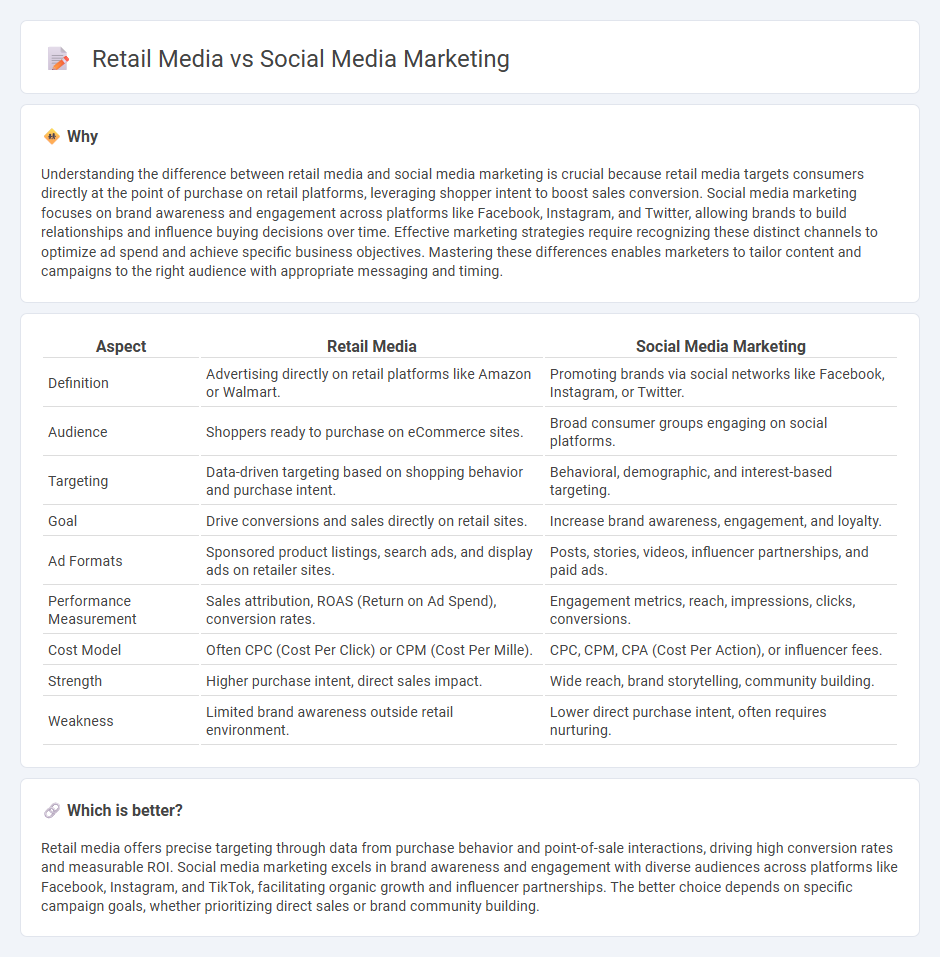
Retail media leverages in-store and online shopping platforms to target consumers at the point of purchase, enhancing conversion rates through contextual advertising and personalized offers. Social media marketing focuses on engaging audiences across platforms like Facebook, Instagram, and TikTok, driving brand awareness and fostering community interaction through content and influencer partnerships. Explore the distinct advantages and strategies of retail media versus social media marketing to optimize your brand's reach and sales performance.
Why it is important
Understanding the difference between retail media and social media marketing is crucial because retail media targets consumers directly at the point of purchase on retail platforms, leveraging shopper intent to boost sales conversion. Social media marketing focuses on brand awareness and engagement across platforms like Facebook, Instagram, and Twitter, allowing brands to build relationships and influence buying decisions over time. Effective marketing strategies require recognizing these distinct channels to optimize ad spend and achieve specific business objectives. Mastering these differences enables marketers to tailor content and campaigns to the right audience with appropriate messaging and timing.
Comparison Table
| Aspect | Retail Media | Social Media Marketing |
|---|---|---|
| Definition | Advertising directly on retail platforms like Amazon or Walmart. | Promoting brands via social networks like Facebook, Instagram, or Twitter. |
| Audience | Shoppers ready to purchase on eCommerce sites. | Broad consumer groups engaging on social platforms. |
| Targeting | Data-driven targeting based on shopping behavior and purchase intent. | Behavioral, demographic, and interest-based targeting. |
| Goal | Drive conversions and sales directly on retail sites. | Increase brand awareness, engagement, and loyalty. |
| Ad Formats | Sponsored product listings, search ads, and display ads on retailer sites. | Posts, stories, videos, influencer partnerships, and paid ads. |
| Performance Measurement | Sales attribution, ROAS (Return on Ad Spend), conversion rates. | Engagement metrics, reach, impressions, clicks, conversions. |
| Cost Model | Often CPC (Cost Per Click) or CPM (Cost Per Mille). | CPC, CPM, CPA (Cost Per Action), or influencer fees. |
| Strength | Higher purchase intent, direct sales impact. | Wide reach, brand storytelling, community building. |
| Weakness | Limited brand awareness outside retail environment. | Lower direct purchase intent, often requires nurturing. |
Which is better?
Retail media offers precise targeting through data from purchase behavior and point-of-sale interactions, driving high conversion rates and measurable ROI. Social media marketing excels in brand awareness and engagement with diverse audiences across platforms like Facebook, Instagram, and TikTok, facilitating organic growth and influencer partnerships. The better choice depends on specific campaign goals, whether prioritizing direct sales or brand community building.
Connection
Retail media and social media marketing are interconnected through their shared goal of targeting consumers at critical points in the purchasing journey. Retail media leverages data-driven advertisements on e-commerce platforms while social media marketing utilizes user engagement and behavioral data to deliver personalized content. Both strategies optimize ad spend by harnessing consumer insights, enhancing brand visibility, and driving sales conversions through targeted digital interactions.
Key Terms
Social Media Marketing:
Social media marketing leverages platforms like Facebook, Instagram, and TikTok to engage targeted audiences through personalized content, influencer partnerships, and paid advertising aimed at driving brand awareness and conversions. It uses advanced algorithms and user data analytics to optimize ad placements and maximize ROI. Discover more about how social media marketing can transform your digital strategy and boost customer engagement.
Engagement
Social media marketing drives engagement through interactive content and personalized messaging on platforms like Facebook, Instagram, and Twitter, fostering brand loyalty and real-time consumer interaction. Retail media leverages point-of-sale data and on-site advertising within e-commerce and retail environments, targeting shoppers with highly relevant product ads to boost immediate conversions. Explore detailed strategies to maximize engagement effectiveness in both channels.
Content Creation
Social media marketing thrives on engaging content tailored to diverse platforms such as Instagram, Facebook, and TikTok, leveraging user-generated videos, influencer collaborations, and interactive posts for brand visibility and customer interaction. Retail media centers content creation around product-specific ads, sponsored listings, and personalized promotions directly on e-commerce websites like Amazon, Walmart, and Target to influence purchase decisions at the point of sale. Explore how integrating bespoke content strategies from both fields can boost your brand's digital footprint and conversion rates.
Source and External Links
What is social media marketing (SMM)? - Productsup - Social media marketing (SMM) uses platforms like Instagram, Facebook, TikTok, YouTube, and Pinterest to connect with audiences, build brand awareness, increase sales, and drive website traffic by posting engaging content and fostering community engagement.
Social media marketing: What it is and how to build your strategy - Social media marketing involves promoting brands and products on platforms such as Instagram, X (Twitter), and Facebook, with an emphasis in 2025 on dynamic, short-form video and influencer marketing for increased consumer engagement.
Social Media Marketing for Businesses - WordStream - Social media marketing is a digital marketing strategy that leverages social networks like Facebook, Instagram, and LinkedIn to reach and engage customers, using both organic content and paid advertising to achieve branding and sales goals.
 dowidth.com
dowidth.com